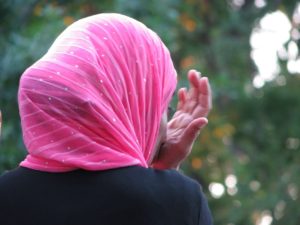For American Muslim women, the question of whether or not to cover their heads can be a difficult issue, as outlined in a piece on National Public Radio. Wearing the hijab can automatically change the dynamics of interactions with other US Americans. One Muslim woman in the piece had this perspective:
“Before I wore hijab, making friends with people who weren’t Muslim was a lot easier,” says Maryam Adamu, who was born in North Carolina to immigrants from Nigeria. Before she began wearing a headscarf three years ago, people didn’t know she was Muslim — until she told them.
“I, like, Trojan-horsed my Islam,” she says, laughing. “Like, ‘You’re already my friend. I know you like me. Now you know I’m Muslim, and you’re going to learn about this faith.’ ” Once she started wearing a headscarf, she encountered a social obstacle she hadn’t seen before. “Now, I have to work a lot harder to get into people’s lives who aren’t Muslim,” she says.
Of course, hijabs, or other clothing associated with Islam such as the body-covering burqa are not the only clothing or body modification which can tend to put folks automatically into particular categories. Black leather, along with multiple tattoos, for example, may point to motorcycle club membership. But few decisions on dress and appearance are as complex as the decision facing US Muslim women in regard to head covering. They face widespread assumptions in the US, which are largely negative, with wearing a hijab most often seen as a sign of oppression. In reality, there are many possible factors, as Yassmin Abdel-Magied demonstrated in her TED talk. A provocative perspective was offered in a Washington Post op-ed by Asra Nomani. An opinion piece in the Guardian earlier this year by Ruqaiya Haris presented an interesting perspective on the introduction of high fashion hijabs, modeled by white Westerners:
As a Muslim woman and the intended target consumer, I thought that the pale white model wearing the clothing served as yet another stark reminder that eastern culture may only be celebrated when it is glamorised by western society, which can in turn capitalise on it. In the context of global Islamophobia, there is something that makes me feel quite uneasy seeing a towering white woman praised for looking glamorous in the same clothing that often leaves Muslim women perceived as “extremist” and puts them at risk of being attacked or even criminalised in some western societies.
